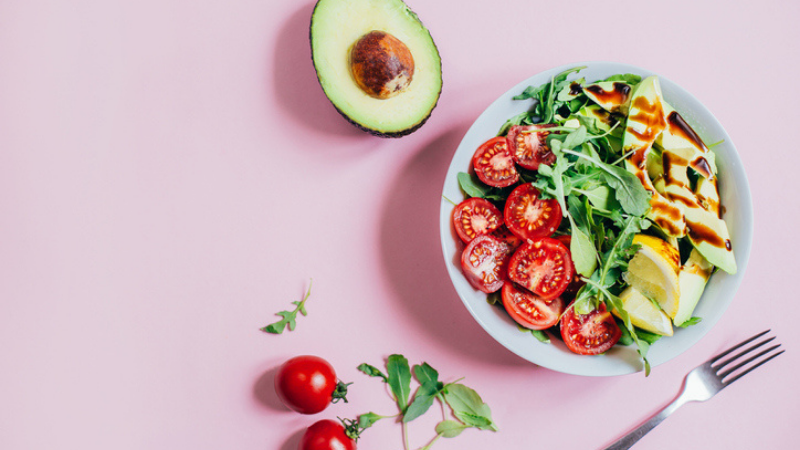
There may be no greater debate in modern nutritional history than whether or not a vegan diet is healthy.
People have different reasons for eating an entirely plant-based diet. Some do so to support animal rights, environmental impact, or health. Whatever your reasons, you may be wondering if a vegan diet will ultimately lead to weight loss.
A vegan diet is likely to help with weight loss for many people—especially those who didn’t eat many fruits and vegetables beforehand. Transitioning to a plant-based diet and cutting out processed foods has been shown to significantly support a healthy weight. The problem is that a staggering amount of people who start eating a vegan diet depend on vegan packaged foods instead of plants, which can lead to weight gain and nutrient deficiencies, low energy, and other health problems.

common pitfalls of a vegan diet (and How to fix them)
Proponents of more meat-centric diets (a Paleo or Keto diet, for example) often point out several potential pitfalls of a vegan diet. Before exploring veganism and weight loss, let’s first see what these challenges are and how you can prevent them.
too many carbs
On a vegan diet, macronutrient ratios naturally tend more toward carbohydrates. Fruits and vegetables are carbohydrates, but they are much more nutrient-dense than sources like grains or legumes. If you eat a vegan diet and find yourself excessively tired or with energy dips and spikes throughout the day, this could signify a blood sugar imbalance. Eating smaller portions of grains, legumes, and beans and larger portions of vegetables can help ensure you eat the most nutrient-dense carbohydrates possible.
Along with fruits and vegetables, strive for plenty of plant-based protein and healthy fat for satiety and blood sugar support with every meal.
vegan junk foods
Unfortunately, many vegan dieters don’t default to plants but instead depend on the ever-growing market of vegan processed and packaged foods. Placing chips, bread, pasta, commercial baked goods, and other packaged vegan foods at the center of your diet is a recipe for disaster. If you eat a vegan diet, your plate should consist of actual plants to avoid serious nutrient deficiencies.
nutrient deficiencies
Nutrient-depleted soil from modern-day agriculture produces plants lacking in vitamins, minerals, and phytochemicals. Eating organic fruits and vegetables helps, but nutritional gaps can still exist even in the healthiest of plant-based diets. Nutrients most likely to be deficient in a vegan diet include iron, zinc, and vitamins B12, A, D, DHA, and EPA. Some vegans decide to incorporate limited high-quality animal products into their diet to meet these needs, such as eggs, organ meats (like liver), and wild fish. Others opt for supplementation to fill nutritional gaps.
what about a vegan diet for weight loss?
Studies show a vegan diet can benefit weight loss, cancer risk, and several markers related to heart health when it centers whole foods vs. processed foods.[1]
More specifically, this research shows that vegetarian and vegan diets can support balanced cholesterol, healthy triglycerides, blood sugar, and weight management. Transitioning to a plant-based diet (whether you are exclusively eating plants or incorporating some animal products) will most often support weight loss, particularly for those that ate a less healthy diet beforehand.
However, eating a vegan diet requires a commitment to doing so in a healthy way, which isn’t always easy. In many cases, a healthy approach to veganism requires effort, awareness, calibration of nutrients, and supplementation. Without this careful approach, weight loss efforts could backfire with nutrient deficiencies, low energy, and other health concerns.
how to maximize weight loss with a plant-based diet
Whether or not you choose to include animal products in your diet, a whole foods, plant-based diet is the nutritional foundation of optimal health and a healthy weight. Vegan, Vegetarian, Mediterranean, Pescatarian, or Paleo, the essential aspect of healthy eating is to avoid processed foods and refined sugar.[2]
Weight loss doesn’t have a one-size-fits-all approach, either. What works well for one person’s biochemistry might not be the best fit for someone else. Finding the diet that helps you feel your best is crucial while paying attention to possible food sensitivities. It’s also fundamental to find a healthy eating style for weight loss you enjoy and can sustain. Stress is shown to be a leading cause of weight gain, so a vegan (or any other) diet should not be stressful day in and day out.[3]
conclusion
A vegan diet might be a practical weight loss approach, as long as it consists of plant foods and avoids vegan processed and packaged foods. Avoid potential challenges by making sure your carbohydrate intake is balanced with plenty of healthy fats and protein sources. Speak with your integrative provider about supplements to prevent or address nutrient deficiencies.

[1] Wang F, Zheng J, Yang B, Jiang J, Fu Y, Li D. Effects of Vegetarian Diets on Blood Lipids: A Systematic Review and Meta-Analysis of Randomized Controlled Trials. J Am Heart Assoc. 2015 Oct 27;4(10):e002408. doi: 10.1161/JAHA.115.002408. PMID: 26508743; PMCID: PMC4845138.
[2] Greger M. (2020). A Whole Food Plant-Based Diet Is Effective for Weight Loss: The Evidence. American journal of lifestyle medicine, 14(5), 500–510. https://doi.org/10.1177/1559827620912400
[3] Scott, K. A., Melhorn, S. J., & Sakai, R. R. (2012). Effects of Chronic Social Stress on Obesity. Current obesity reports, 1(1), 16–25. https://doi.org/10.1007/s13679-011-0006-3












-1.jpg)
-1.jpg)




